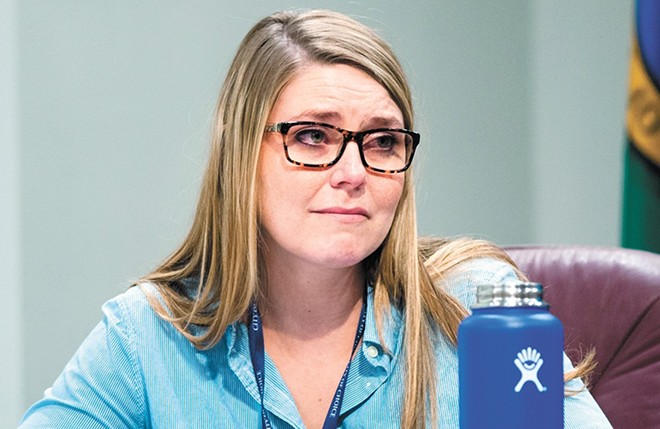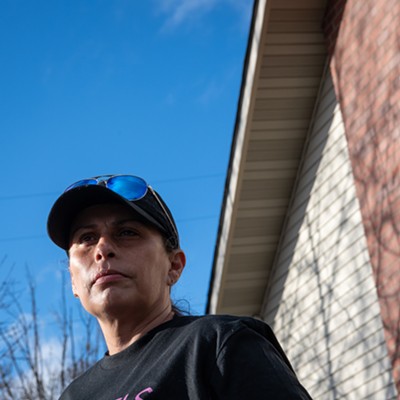
At other times throughout her tenure on the council, Burke has generally bristled at what she's seen as giveaways to businesses or developers, wondering whether incentives actually pay off.
Part of her "no" vote comes from that sort of skepticism — she wonders whether asking the Liquor and Cannabis Board to allow selling mixed drinks to-go will actually make much of a difference at this point.
“Selling a few cocktails sold toward the end of COVID is not going to save a business,” she says.
But this time, there's also deeper, more personal motivation to her vote.
"I know that a lot of businesses make money from alcohol," she said at a Council Finance Committee meeting on Monday. "But there’s also a lot of people who are trying to stay sober during this time.”
She elaborated in an interview with the Inlander Tuesday.
"I am an alcoholic," Burke says. "I struggle with my alcoholism. I know I have a lot of friends who are struggling right now as well. Being in this situation. I don’t think we need to push alcohol on more people."
For years, she says, she'd used alcohol as a way to treat her undiagnosed anxiety. She'd drink before parties to feel more confident. She'd drink after a rough day as a way to cope. She'd drink as a reward for a particularly productive day.
She didn't have a problem, she thought.
When her partner, Devon Wilson, would gently ask her if she actually wanted to have that additional beer, she found herself getting defensive and irritated.
But she also found that drinking began to start driving problems instead of solving them.
"I was afraid I would drive after three drinks. My anger was getting worse. My irritation was getting worse," Burke says. "I didn't want to get on Twitter late at night if I had a few drinks and say something I didn't want to say. I didn't want to say things to my friends that were rude and unhelpful in certain conversations. And it was leading toward that."
In particular, she recalls a camping trip in September of 2018.
She woke up. She'd puked. And on the nine-hour drive back home, as she stewed in her misery and self-hatred and sickness and hungover guilt, she had an epiphany: Her drinking needed to stop.
"I hit a point in my life where I realized that if I wanted to keep everything good in my life, I needed to drop drinking," Burke says. "Because I had this feeling and this notion and this intuition that I was going to lose everything."
If she wanted to keep her home, her job, her partner, her friends, she needed to prevent her addiction from overwhelming them.
The first five months of sobriety were the most difficult. Her anxiousness got worse. She would get that panicked breathless feeling of not knowing what to do or how to act. The same conversations would play over and over and over again in her head on a loop. She couldn't sleep.
Eventually, she started seeing results. Her skin felt better, her hair felt better. She lost a few pounds. But it wasn't so simple. There were underlying issues, she says, that quitting drinking laid bare but didn't automatically solve.
So she began attending Alcoholics Anonymous meetings. Burke stresses that's she's not speaking on behalf of, or even endorsing, AA. But she says she found the community, and the steps they led her through, working on a way to heal herself completely, invaluable.
"Just to be around people who get it and understand it and have stories, you just have immediate allies around you," Burke says.
That, she says, is what's so frightening about the coronavirus crisis.
If she were still using alcohol, she says, she could easily picture herself spending all day drinking during the stay-at-home order, knowing that she wouldn't have to get up the next day to go anywhere.
And so, despite recognizing the importance of alcohol to the local economy, she argues that it's "such a harmful drug to a lot of people that I just feel like we just don't need more of it."
Despite all the focus on the damage by meth and opioids, alcohol kills more people than every drug overdose combined.
City Council President Breean Beggs praised Burke for sharing her experience.
But while Burke's story made him pause, he says he ultimately signed the letter for the liquor control board.
Beggs says he's concerned for those who have addiction problems — but he believes it's more the government's role to try to help them rather than to restrict or reduce access to addictive substances that are already deeply part of our culture.
It's not the first time Burke has been willing to speak out about a harrowing personal experience. Before being elected, she spoke out about her experience being sexually harassed by a former City Council member.

























